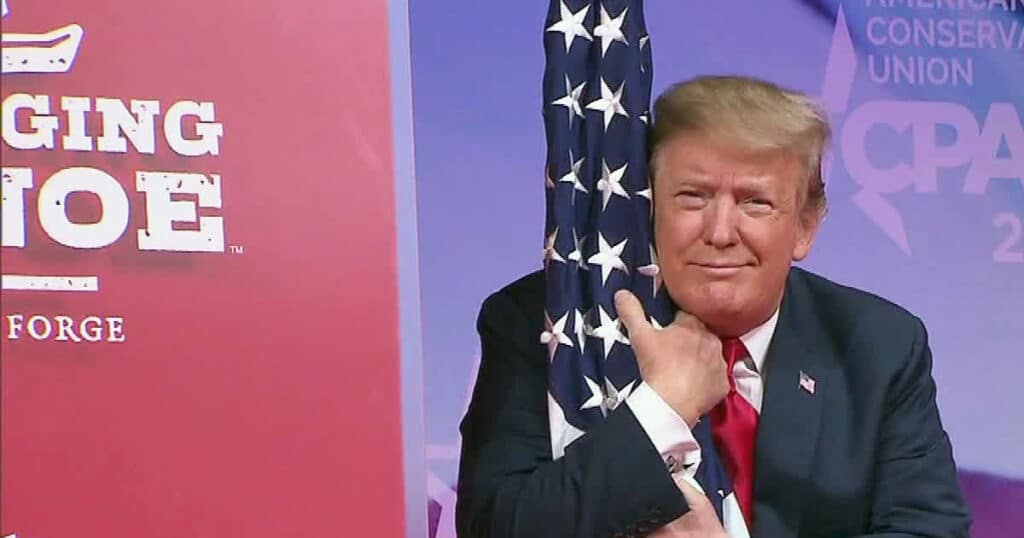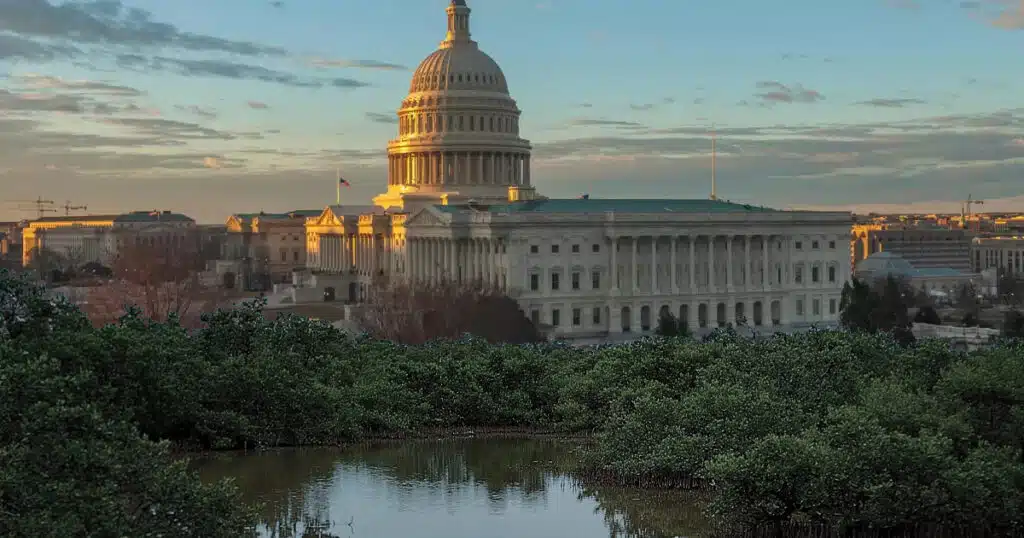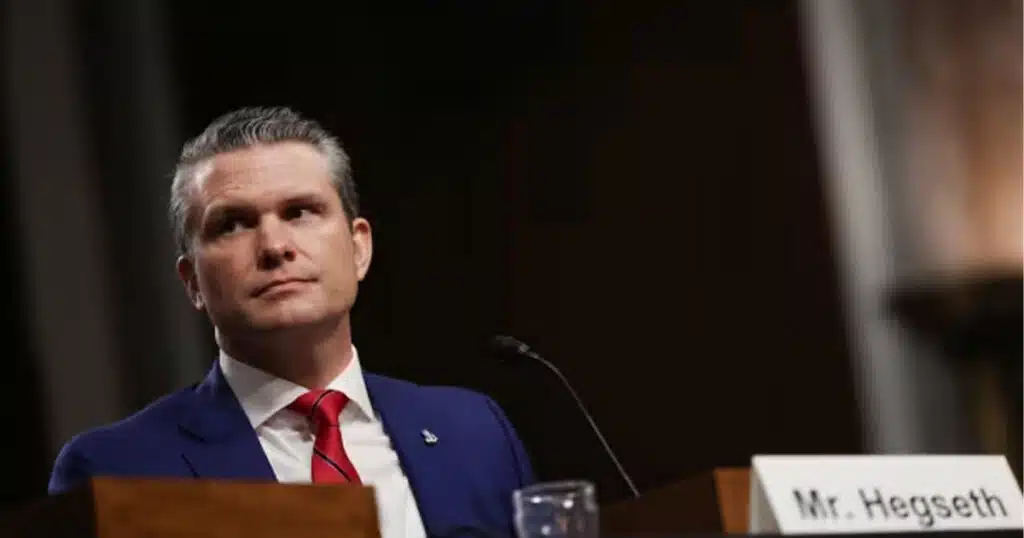
Trump Plan To Bypass Congress and Starve “The Deep State”
Sources close to former President Trump say he has a plan for keeping Congress from ever again forcing him into “disgraceful” and “ridiculous” spending situations. If he returns to the White House, Trump will seek to resurrect authority that Congress stripped from the presidency almost a half century ago.
What President Nixon squandered, his campaign promises, Trump will restore, namely the impoundment power. “A lot of you,” the former president told a New Hampshire crowd Thursday, “don’t know what that is.” Indeed, few now remember it.
Impoundment, if restored, would allow a president, in theory, to simply refuse to spend appropriations by Congress. More than just an avenue to cut spending, Trump sees that kind of authority as key to starving, and thus crushing, the so-called “deep state.”
But such a move would fundamentally alter the balance of power, and any effort to restore the long-forgotten authority virtually guarantees a protracted legal battle over who exactly controls the power of the purse. Trump welcomes that fight. Some budget experts believe he won’t get anywhere.
Regardless, advisors close to the former president tell RealClearPolitics they are drawing up plans to challenge the 1974 Congressional Budget and Impoundment Control Act in court, and if that fails, to lean on the legislature to repeal it. The latter would require passing a law to surrender power, something lawmakers are loath to do.
Congress already went to war with another president who had expansive views of his own authority. And Congress won.
Inflation in the 1970s, the Nixon White House complained, was the result of a profligate “Credit Card Congress.” The California Republican warned Capitol Hill not to spend in excess of $250 billion. When his warning was ignored, Nixon simply refused to spend the appropriated money. A rebuke from the Supreme Court followed when the president impounded funding for environmental projects. But weakened by Watergate, Nixon eventually signed legislation effectively surrendering a power that had been exercised from the presidencies of Thomas Jefferson to Lyndon B. Johnson.
Russ Vought, Trump’s last director of the Office of Management and Budget, calls the concession of impoundment power “the original sin” that ensured “the executive branch no longer plays a meaningful role” in the appropriations process. Vought told RCP in an interview that the power of the purse has become “caricature,” where rather than “setting ceilings,” Congress now sets “spending floors.”
Hence, Trump’s “unhappy” signature on multiple multi trillion-dollar spending bills.
Trump promised he would “never sign another bill like this again” before putting his signature on a “crazy” $1.3 trillion spending bill in 2018. Two years later, he signed another omnibus bill, this one worth $1.4 trillion, that he called “disgraceful.” Both times, Trump justified voting for the bloated bills conservatives loathed by pointing to increased military spending.
Restoring impoundment authority, thus giving presidents an option to curb spending beyond just the veto, current Trump campaign and former Trump administration officials tell RCP that was part of the plan for a second term that never came.
The former president said he believes the 1974 law that gutted impoundment is unconstitutional, and if returned to the White House, would govern accordingly.
“Yes, there’s the effort to have it overturned in courts. Yes, there is the legislative effort, but when you think that a law is unconstitutional,” Vought told RCP, the administration ought to look “to do the bare minimum of what the courts have required,” and “to push the envelope.”
Trump did something like this, exercising what Vought called “impoundment-like authorities,” when he froze nearly $400 million in foreign aid to Ukraine, even though the funds were congressionally appropriated. The Government Accountability Office later said that in doing so, Trump violated the law. He was impeached by the House over a phone call to Ukrainian President Zelensky concerning the money.
Trump’s OMB disputed the GAO ruling at the time, saying the administration was simply its apportionment authority to spend the money according to the most efficient timetable.
“The reason why there wasn’t an impoundment was because we did not have the authority just to pocket the money and not spend it,” Vought recalled, saying that if a new paradigm was in place, the administration “potentially would have had the ability to go further and pocket the money.”
Trump believes impoundment would be “a crucial tool” in his fight with the administrative state. “Bringing back impoundment will give us a crucial tool with which to obliterate the Deep State, Drain the Swamp, and starve the Warmongers,” he said in campaign video first obtained and reported by Semafor. “We can simply choke off the money.”
His campaign pointed RCP to the Cybersecurity and Infrastructure Security Agency within the Department of Homeland Security, an entity that House Republicans allege has been involved in censorship of Americans, as a prime example of where dollars could be impounded.
But even some conservatives have their doubts. Kevin Kosar, a senior fellow at the American Enterprise Institute, said that when it comes to cutting spending appropriated money after the fact, there “is a limited amount of wiggle room.”
“The idea that a president is going to achieve any sort of significant savings or reduction in the size of the administrative state by exercising impoundment authorities is patently ludicrous,” Kosar told RCP.
The policy wonk agrees that the reform Nixon signed into law, mandating a complex and cumbersome budgeting process, seldom works. But without repealing and replacing that law, he said, “a president flat out refusing to spend money that was clearly appropriated for a particular purpose, saying he just doesn’t want to do it, pretty much would be grounds for impeachment.”
Linda Bilmes, an assistant secretary at the Department of Commerce during the Clinton administration, agrees that the current budget process “has become so dysfunctional that it is very ripe for reforms.”
Now a lecturer at Harvard’s Kennedy School of Government, she points to the partisan gridlock and numerous government shutdowns that are a feature of the current process. “The number of shutdowns in the entirety of U.S. history before 1974,” Bilmes said in an interview with RCP, “was zero.”
Congress has been kicking around ideas for some time on how to reform the way they spend taxpayer money. Lawmakers consistently fail to pass individual appropriation bills, opting instead to approve spending all at once with a single bill, usually at the end of year and the last minute.
Even if the process is reformed, however, Bilmes said that “the basic premise of the law, which is that the Constitution provides Congress with the ultimate authority, is very unlikely to change.”
She added that although she disagrees with the idea that reducing the national debt requires gutting the Impoundment Act, there is a recent precedent for taming runaway spending. Bilmes pointed RCP to the agreements hammered out between Bill Clinton and then-Speaker Newt Gingrich in the 1990s. That is possible again. In theory.
This article was originally published by RealClearPolitics and made available via RealClearWire.



